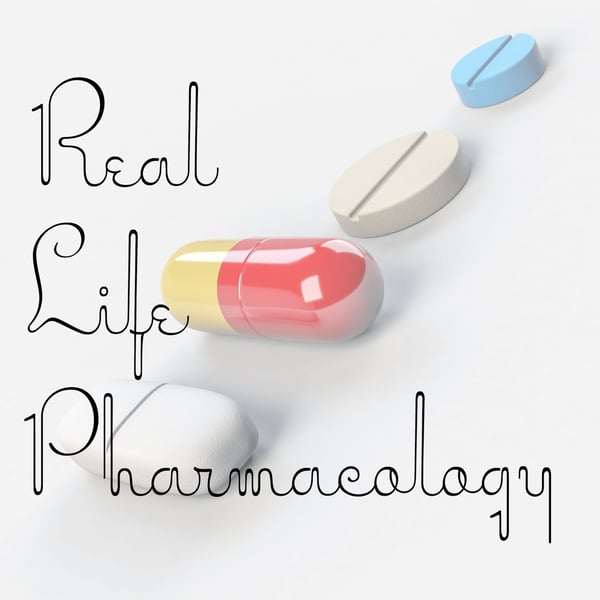Esomeprazole (Nexium) Pharmacology
Real Life Pharmacology - Pharmacology Education for Health Care Professionals
Eric Christianson, PharmD; Pharmacology Expert and Clinical Pharmacist
5 • 716 Ratings
🗓️ 14 April 2022
⏱️ 16 minutes
🧾️ Download transcript
Summary
I spend a good amount of time discussing the esomeprazole and clopidogrel interaction in this podcast episode.
Esomeprazole inhibits CYP2C19. This can cause an increase in citalopram concentrations and raise the potential for QTc prolongation.
It is critical to reassess the length of therapy and the dose of PPIs like esomeprazole.
Transcript
Click on a timestamp to play from that location
| 0:00.0 | Hey all, welcome back to the Real Life Pharmacology podcast. I'm your host, pharmacist, Eric Christensen. |
| 0:05.7 | Thank you so much for listening today. Go check out RealLife Pharmacology.com. Go subscribe there. |
| 0:12.5 | Simply an email will get you access to a 31-page PDF on the top 200 drugs. |
| 0:18.7 | Great review resource, study resource, whether you're practicing or a student |
| 0:23.3 | going through pharmacology classes. So definitely go check that out. All right, let's talk about |
| 0:29.5 | the drug of the day today, and that is isomeprosol. Brand name of this medication is nexium. |
| 0:35.2 | I definitely see it used fairly often in clinical practice. It is considered a |
| 0:40.7 | PPI. What is a PPI? Proton pump inhibitor. And mechanistically, this drug inhibits, as the name says, |
| 0:49.9 | inhibits proton pumps in the gut. and those proton pumps pump hydrogen ions, which increases the |
| 0:59.4 | acidity and reduces the pH of the stomach. So by blocking those pumps, you're going to raise the pH and reduce the acidity and hopefully help treat symptoms of |
| 1:17.3 | GI conditions such as GERD, generalized dyspepsia, heartburn, barit's esophagus. |
| 1:27.1 | We're going to use these medications for GI prophylaxis, |
| 1:31.4 | peptic ulcer disease, so lots of different uses that you're going to see a drug like |
| 1:37.1 | isomeprosol used for. Dosing of this medication typically ranges in 20 to 40 milligrams once daily. |
| 1:46.1 | Under rare circumstances where we need more aggressive dosing, worsening symptoms, |
| 1:52.8 | significant disease state, such as Zollinger-Ellison syndrome, barit's esophagus, |
| 1:59.3 | you might see up to 20 to 40 milligrams twice a day. |
| 2:05.1 | Now, administration, this is a question that I definitely have been asked about quite a bit |
| 2:10.5 | by nursing staff and other folks. So do we have to give it before meals? And I would say, ideally, that is the best, you're going to get the best results, the best efficacy |
| 2:23.3 | per manufacturer recommendations. |
| 2:27.3 | Now are there people that get out of bed and they want to eat right away and they, you know, want to take their |
| 2:34.2 | PPE at the same time as their breakfast, that type of thing. Yes, I've certainly had patients |
... |
Please login to see the full transcript.
Disclaimer: The podcast and artwork embedded on this page are from Eric Christianson, PharmD; Pharmacology Expert and Clinical Pharmacist, and are the property of its owner and not affiliated with or endorsed by Tapesearch.
Generated transcripts are the property of Eric Christianson, PharmD; Pharmacology Expert and Clinical Pharmacist and are distributed freely under the Fair Use doctrine. Transcripts generated by Tapesearch are not guaranteed to be accurate.
Copyright © Tapesearch 2025.

